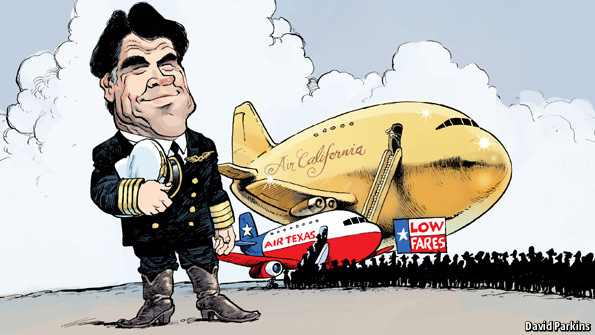The governor of Texas thinks his state’s thrifty model will appeal to America

Now, as he prepares to retire as Texas’s longest-serving governor, Mr Perry is poised for a re-launch. Think-tank boffins and foreign-policy gurus have descended on the Ionic-columned governor’s mansion in Austin, briefing him on everything from monetary policy to Islamic extremism. He has talked geopolitics in London and Warsaw and debated energy policy with Communist bosses in China. On December 2nd he invited donors to lunch. Wisely, he offered more than happy-talk. When voters handed Republicans big wins in the mid-term elections it was no declaration of love for the Right, he told guests. Theirs was a vote of no-confidence in Barack Obama, and a cry of despair at Washington dysfunction and the lack of respect enjoyed by America abroad. Voters are offering Republicans one more chance to govern, with the message: “Don’t blow it.”
Not blowing a fresh White House bid is Mr Perry’s own mission. Last time he was “a bit arrogant,” he admits in an interview at his mansion, reclining in an armchair flanked by busts of Reagan and Churchill. He mistakenly assumed that running Texas was preparation for a presidential bid. This time, he has spent 22 months preparing “intensively”.
Pundits are asking: is Rick Perry ready? When asked, prominent Republicans advising Mr Perry offer warm words: they call him “energised” and “intellectually curious”. The difference from 2011 is “night and day”, says one. The governor will make a final decision next spring. In an unexpected twist, he was recently indicted for abuse of power, after leaning on an Austin prosecutor to resign after her arrest for drunk-driving. His indictment (which even some liberal jurists think looks like the hounding of a governor for doing his job) will either go away or stop him dead. Time will tell if he is up to a fresh run, but that is the wrong question. A better one is: what does Mr Perry stand for?
Any answer must begin with his governing record. A “Texas miracle” say boosters, pointing to the millions who have moved to his state in recent years, drawn by low taxes, cheap housing, light-touch regulation and courts that take a dim view of frivolous lawsuits. Mr Perry is keen on comparisons with highly-taxed, regulation-choked California, or as he calls it, the state from which he poaches employers “on a regular basis”. During his 14 years as governor, he beams, a third of all net jobs created in America were created in Texas.
A mirage, retort many on the Left: Mr Perry rode an energy boom and stole jobs from other states with tax breaks and other bribes. Millions in Texas lack health insurance. The state tolerates horrible inequalities. Sceptics charge that an extremist lurks behind the governor’s charm, whether he is attacking the federal government for leaving a lethally “porous” border between Mexico and Texas, or displaying a serene confidence as he signed off on 279 executions as governor. If people move to Texas—such critics murmur—it’s because they are happy with crappy.
Americans don’t move to crappy places, retorts Mr Perry. He reels off statistics about the Texan quality of life: the number of well-paid new jobs, the 35,000 doctors who arrived once dodgy lawsuits were curtailed, even the number of theatre seats in Houston (only New York has more, he says). The Texan way is a choice, he says: the state offers people as much government as they want, rather than what Washington thinks is good for them.
You get what you pay for
This, surely, will be Mr Perry’s contribution to the debate if he
runs. Reduce modern politics to their essence, and some of the angriest
arguments turn on a crisis of affordability. Most households have seen
their incomes stagnate while certain essential middle-class goods (such
as college education and health care) have soared in price. Too many
Democrats seem to think that the solution is to pluck more money out of a
magician’s hat. Some suggest that new taxes can painlessly fund more
government largesse, or insist that firms can easily afford to pay
higher wages. Too many Republicans put their faith in magical policies:
hinting that tax cuts and deregulation alone will return the economy to a
Golden Age of affluence.Mr Perry stands out for tackling, squarely, the fact that Americans are used to services that increasingly cost more than they (or any government) can afford. Rather often, the Texan solution involves basic services that aim to be cheap but good enough. Call it the low-cost airline model: offering a minimal service that is safe and reliable, then letting consumers pay for frills and extras if they like. Mr Perry grumbles at the idea that Texas is a discount model for anything. But competition is certainly at the heart of his pitch. He has pressed Texan colleges to offer degrees for only $10,000, for example. He has rejected Obamacare’s calls to expand health coverage on Washington’s terms. He thinks that Texas should be allowed to cover the poor as it sees fit (with an emphasis on creating jobs that make health care affordable, rather than safety nets). As president, he would be delighted to let other states offer onerous taxes and lavish services. Some people want such things, he agrees: they are “free to live in California”.
Not everyone wants to live in Texas. But Mr Perry’s pitch is worth debating. Forget that “Oops,” and hope that he runs.
No comments:
Post a Comment